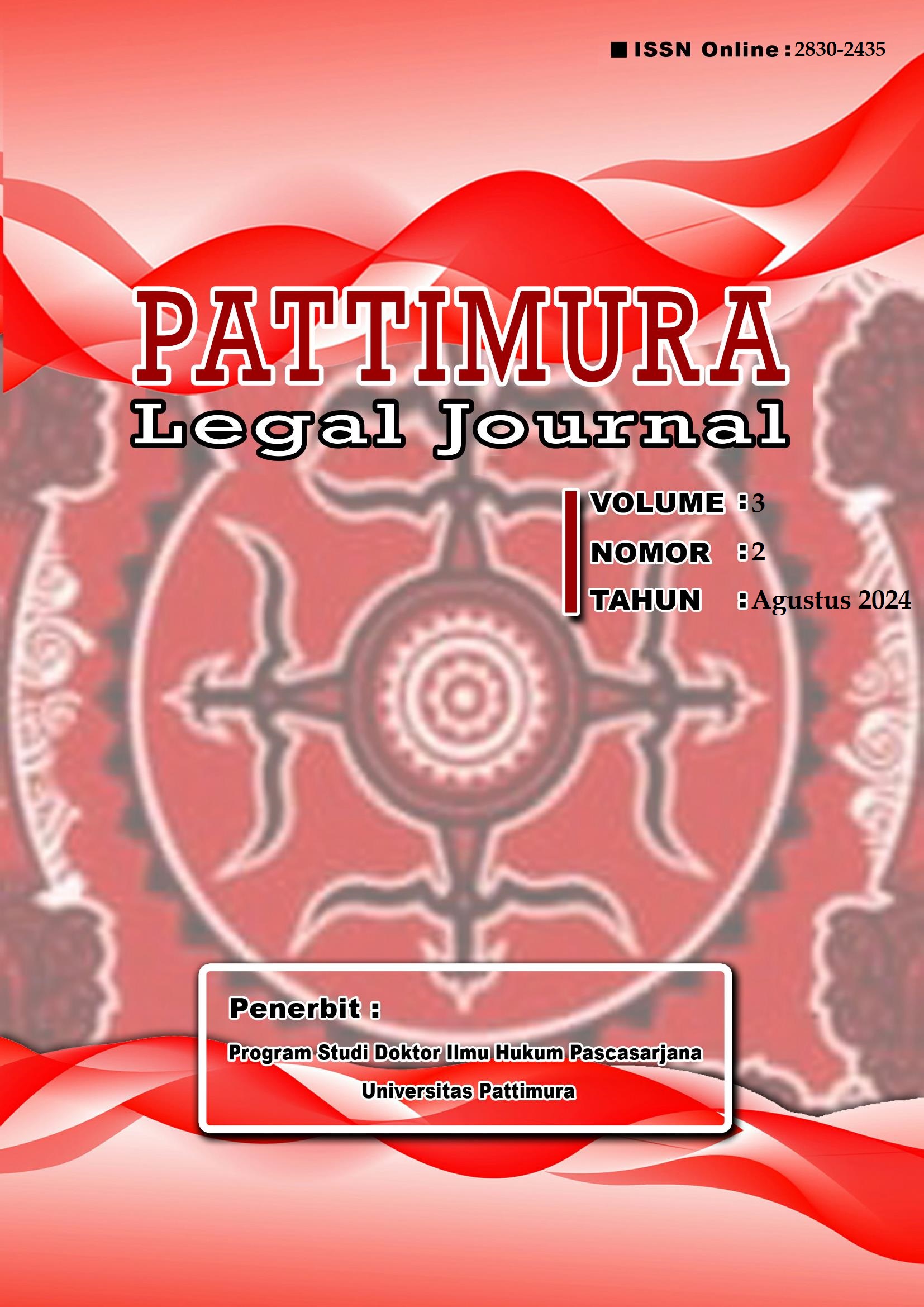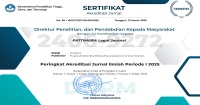Implikasi Ambiguitas Kreditur Separatis Dan Kurator Dalam Pembagian Boedel Debitor Pailit Menurut Perspektif Philosophy
Abstract
Introduction: Completing debt and receivables agreements with serious material security objects between creditors and debtors through the Bankruptcy route. Bankruptcy as a form of dispute resolution regulated in Articles 749-910 of Wetboek van Koophandel which has been codified through Law Number 37 of 2004 concerning Bankruptcy and Postponement of Debt Payment Obligations.
Purposes of the Research: To find legal rules that specifically regulate the Ambiguity Implications of Separatist Creditors and Curators in Boedel, Debtors Bankruptcy.
Methods of the Research: The method used in this writing is an extensive interpetation method to try to find a law in the future (ius constituendum) because there is still no legal rule that specifically regulates the Ambiguity Implications of Separatist Creditors and Curators in Boedel Debtors Bankruptcy. Then we also use a systematic interpretation method because in this study the author tries to relate several laws and regulations in Indonesia.
Results Originality of the Research: The bankruptcy study is inseparable from the collateral by the debtor who has experienced business bankruptcy, which has given an advantage to separatist creditors and curators in executing the collateral before it is further studied by the Government through the Curator. In fact, through its superior nature, the settlement of receivables by separatist creditors is quite ambigiutive and comprehensive and fast without having to apply for bankruptcy of the previous debtor.
Downloads
References
Jurnal
Hartanto, Heri. “Perlindungan Hak Konsumen Terhadap Pelaku Usaha Yang Dinyatakan Pailit.” ADHAPER: Jurnal Hukum Acara Perdata 2, no. 2 (2016): 315–328.
Izzulhaq, Muhammad Hafizh. “Hak Upah Pekerja Atas Perusahaan Pailit: Disharmonisasi Peraturan Perudang-Undangan Cipta Kerja.” Kertha Semaya 12, no. 1 (2023): 3132. https://doi.org/https://doi.org/10.24843/KS.2023.v12.i01.p09.
Kamahayani, Monitacia, and Suyud Margono. “Penerapan Asas Pari Passu Pro Rata Parte Terhadap Pemberesan Harta Pailit PT Dhiva Inter Sarana Dan Richard Setiawan (Studi Kasus Putusan Mahkamah Agung Republik Indonesia Nomor: 169 PK/Pdt. Sus-Pailit/2017).” Jurnal Hukum Adigama 3, no. 1 (2020): 71–91. https://journal.untar.ac.id/index.php/adigama/article/view/8892.
Kartoningrat, Raden Besse, and Isetyowati Andayan. “Mediasi Sebagai Alternatif Dalam Pengurusan Dan Pemberesan Harta Pailit Oleh Kurator Kepailitan.” Halu Oleo Law Review 2, no. 1 (2018): 291-305.
Khairiyati, Fithry; Fauziah, Anisa; Samiyono, Sugeng. “Hak Atas Upah Pekerja Pada Prusahaan Yang Dinyatakan Pailit Dalam Perspektif Hukum Ketenagakerjaan.” Kertha Semaya 11, no. 2 (2023): 448–55. https://doi.org/https://doi.org/10.24843/KS.2023.v11.i02.p19.
Kosasih, Putri Ayu Lestari. “Prkatek Hak Eksekutorial Separatis Kreditur Terhadap Debiturnya Yang Dinyatakan Pailit Pada Perbankan Di Indonesia.” Lex Privatum 1, no. 2 (2013): 171–87. https://ejournal.unsrat.ac.id/v2/index.php/lexprivatum/article/view/1714.
Putra, Fani Martiawan Kumara. “Eksistensi Kreditor Separatis Sebagai Pemohon Dalam Perkara Kepailitan.” Perspektif 19, no. 1 (2014): 1–19. https://doi.org/10.30742/perspektif.v19i1.606.
Setiawan. “Hak Tanggungan Dan Masalah Eksekusinya.” Varia Peradilan 11, no. 131 (1996): 141–57.
Simanjuntak, Herry Anto. “Prinsip Prinsip Dalam Hukum Kepailitan Dalam Penyelesaian Utang Debitur Kepada Kreditur.” Jurnal Justiqa 2, no. 2 (2020): 17–28. http://portaluniversitasquality.ac.id:5388/ojssystem/index.php/JUSTIQA/article/view/458.
Sularto. “Perlindungan Hukum Kreditur Separatis Dalam Kepailitan.” Mimbar Hukum 24, no. 2 (2012): 241–53. https://doi.org/10.22146/jmh.16128.
Wijaya, I Gede Ngurah Rama Putra, and I Dewa Ayu Dwi Mayasari. “Perlindungan Hukum Terhadap Kreditor Separatis Atas Kekurangan Pemenuhan Piutang Pasca Eksekusi Jaminan Kebendaan Dalam Kepailitan.” Jurnal Kertha Desa 11, no. 3 (2023): 1886–98. https://ojs.unud.ac.id/index.php/kerthadesa/article/view/95392.
Buku
Amrih Suci, Ivida Dewi. Hak Kreditur Separatis Dalam Mengeksekusi Benda Jaminan Milik Debitur Pailit. Yogyakarta: Laksbang PRESSindo, 2011.
Badrulzaman, Mariam Darus. Mencari Sistem Hukum Benda Nasional. Bandung: Citra Aditya Bakti, 2010.
Budiono, Herlin. Kumpulan Tulisan Hukum Perdata Di Bidang Kenotariatan. Bandung: Citra Aditya Bakti, 2008.
Fuady, Munir. Hukum Pailit Daam Teori Dan Praktek. Bandung: Citra Aditya Bakti, 2002.
Jono. Hukum Kepailitan. Jakarta: Sinar Grafika, 2015.
Marzuki, Peter Mahmud. Penelitian Hukum,. Jakarta: Kencana, 2016.
Mertokusumo, Soedikno. Mengenai Hukum Suatu Pengantar. Yogyakarta: Liberty, 2007.
Muljadi, Kartini. “Kreditur Preferens Dan Kreditur Separatis Dalam Kepailitan, Undang-Undang Kepailitan Dan Perkembangannya.” In Rangkaian Lokakarya Terbatas, 168. Jakarta: Pusat Pengkajian Hukum, 2005.
Subekti, R. Suatu Tinjauan Tentang Sistem Hukum Jaminan Nasional. Jakarta: Bina Cipta, 1981.
Online/World Wide Web, Disertasi/Tesis/Skripsi, Dan Lain-Lain
Elijana. “Peraturan Pemerintah Pengganti Undang-Undang Nomor 1 Tahun 1998 Tentang Perubahan Undang-Undang Kepailitan.” Jakarta, 1998.
Copyright (c) 2024 Ronald Saija, Iming Maknaan Tesalonika, Herman Bakir (Author)

This work is licensed under a Creative Commons Attribution-NonCommercial 4.0 International License.
Authors who publish their manuscripts in this Journal agree to the following conditions:
- The copyright in each article belongs to the author, as well as the right to patent.
- Authors are able to enter into separate, additional contractual arrangements for the non-exclusive distribution of the journal's published version of the work (e.g., post it to an institutional repository or publish it in a book), with an acknowledgment of its initial publication in this journal.
- Authors are permitted and encouraged to post their work online (e.g., in institutional repositories or on their website) prior to and during the submission process, as it can lead to productive exchanges, as well as earlier and greater citation of published work.
- Authors have the right to self-archiving of the article (Author Self-Archiving Policy)






















